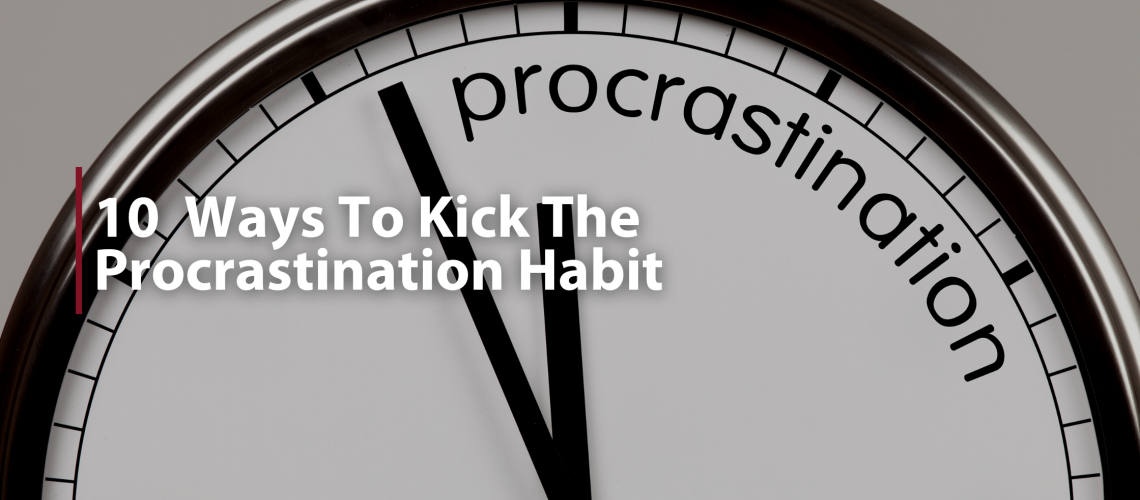
Here at WIDE IMPACT, we believe that change is possible. And, we shouldn’t forget that to become better, all of us need to channelize our inner strengths and positive energies in the right direction. So, If you were having trouble overcoming procrastination, you’d be happy to know there are a few things that can help. We’re not talking about prohibition to work or anything like that, but rather small, achievable goals that will ultimately allow you to become more efficient in your tasks and accomplish what you need in life.
Procrastination is a habit. An expensive habit that can be broken, if you’re not careful, procrastination can cost you time, money and peace of mind.
If you’re a procrastinator, you know all too well how it feels to put things off until the last minute and then rush around, trying desperately to get everything done.
But what if there was a way to stop procrastinating and start getting things done?
So how do we break this habit? Here are 10 ways to kick the procrastination habit once and for all:
1- Stop waiting for inspiration.
Stop waiting for inspiration. Do it now. Just start it. Don’t give excuses. Don’t put things off till you’re “in the mood.” The mood might never comes! It’s both a cunning disguise and a stalling technique.
If you don’t start, then there will never be a “right” time to start. You’ll just keep putting it off until it’s too late or too hard, neither of which are good outcomes for many types of projects.
And as said by Carl Jung: “what you resist not only persists, but will grow in size”. So if you keep putting things off, the more resistance and pain you’ll feel about them, which will make them even harder to do.
2- Start At The End.
Plan with the end in mind. Create a detailed to-do list and prioritize your tasks in order of importance. Then work backwards from the due date, listing each step needed to complete the task and allocating time slots accordingly.
Don’t Break The Chain! Use an accountability partner, put up sticky notes on your computer screen or write down your deadlines in a notebook that you carry with you everywhere so that every time you see them they remind you of what needs to get done!
3- Get Rid Of Distractions
If you’re reading this, you probably have a lot of things vying for your attention—social media, news sites, games on your phone. The biggest timewasters are often the things we don’t even realize are stealing our time. If you have a habit of mindlessly checking your email or social media, set up a rule for yourself to only do it once an hour—and stick to it!
If you’re working on something important, take some time to really focus on it by turning off all notifications and other distractions.
Schedule specific blocks of time in your calendar dedicated solely to working on whatever project or task is most important at the moment. This way, when someone asks you if they can talk later this week, or if you could help them out with something ASAP tomorrow afternoon, you know that there’s no room in your schedule for anything else until that project is complete!
4- Create A Workspace That Works For You
Create A Workspace That Works For You: Your workspace should be comfortable, but not too comfortable. You want to feel like you’ve escaped the distractions of home, but you also don’t want to feel like you’re at work (you know what I mean).
If your space is messy or disorganized, it can really affect how productive you are while working there. Clear off surfaces and set up filing systems so there aren’t any papers lying around getting in your way. This will make you feel more organized and focused on what matters most at this moment in time—and that’s getting stuff done!
5- Break Big Tasks Into Small Ones
When you break down your task into small, manageable chunks, it becomes easier to accomplish and less daunting.
The best way to do this is to write down all the steps that need to be taken to complete the larger task. Then, set deadlines for each step and make sure they are reasonable. If you have a deadline that is too close together or too far apart, it will not give you enough time between steps to complete them properly.
Once you have broken down your large tasks into smaller ones with realistic deadlines, set aside a specific amount of time each day or week to work on those tasks so they don’t get pushed back indefinitely
6- Prioritize Wisely
One of the biggest reasons people procrastinate is because they don’t know what’s important, so they put off doing everything until later.
But if you can learn to prioritize your tasks, you’ll be able to get through your day more efficiently and with less stress.
7- Practice
You can’t just read a blog post about how to stop procrastinating, then go back to your old ways. You have to practice actually doing things instead of putting them off.
Think of it like learning a new skill: you have to practice in order to get better at it. Just because you’ve read a lot about how to play the piano doesn’t mean you’ll be able to sit down and play a concerto after only reading one book on the subject—you have to actually sit down and practice playing!
So if you want to kick the procrastination habit, start small. Try making a list of things that need doing, then do those things before moving on to the next thing on your list—and so on until you’ve finished everything on there!
8- Make bad habits harder to do (and good ones easier)
You know that you should be doing something else. You know it, and yet you can’t stop yourself from getting sucked into procrastination mode. So, how do you get out of this habit?
The first thing you need to do is figure out what your bad habit is, then it’s time to make it harder for yourself to engage in that behavior. For example, if you always find yourself on Facebook when you should be working or spend hours scrolling through Instagram when you should be working on a project, consider downloading an app that blocks access to these sites when certain times of day come around.
You’ll also want to make sure that the things you need in order to do the things that matter most are easily accessible. If you’re trying not to procrastinate while studying, keep all of your books and notebooks within arm’s reach so that they’re easy to grab when you need them. And if there’s something else on your desk or in your office (like a snack or beverage) that might distract you from getting work done, move it somewhere else so that it won’t tempt
9- Reward yourself for finishing tasks
If you’re anything like me, you probably love the feeling of crossing something off your to-do list. It feels so nice to see that thing get checked off, and it makes you feel accomplished! But what if there were some way to make that feeling last even longer?
If you have a task that needs completing but aren’t sure how long it will take or how much effort will be required, why not give yourself a treat as a reward for finishing it.
I’m a busy person, and I know it can be hard to stay focused on a task for more than an hour at a time. That’s why I’ve developed a system that allows me to reward myself as soon as I complete a block of dedicated work time.
Here’s how it works: If I spend an hour working on my business plan or proposal, then I allow myself 15 minutes of social media scrolling (or whatever else you prefer). In this way, I’m able to keep myself focused while still allowing myself a break after completing a part of my project.
10- Set Deadlines For Yourself And Stick To Them!
A deadline is a time by which something must be done. It’s a goal or target that you set for yourself and make an effort to reach by a specified time period. Without a deadline, there will be no urgency for action; instead, you’ll just keep putting off doing what needs to get done until later—and later never comes.
Just like in any other area of life, setting realistic goals and deadlines is key if you want to succeed at anything in life—including becoming more productive at work! If your boss gives you an assignment on Monday morning at 9am, then make sure that it’s turned in by Tuesday afternoon at 4pm (within 24 hours). Having a deadline is important because it forces you to get things done quickly, which can be difficult if you’re used to procrastinating.
Set reminders for yourself on your phone or computer so that you don’t forget any important tasks or meetings. This will help you stay organized throughout the day and make sure nothing slips through the cracks. You can even use an app like Evernote so that all of your notes are stored securely online where they won’t get lost or damaged over time (which happens more often than people realize!).
In conclusion, Procrastination can be overcome with planning and motivation. If you can get started, you can build momentum, and if you can build momentum, there’s very little that can stand in your way!
Life is short and time is fleeting; you only get so much of it. Don’t waste it on procrastination. Procrastination is the thief of time, which makes the ability to see and overcome it essential for success. Procrastination is bullying, and all you need to do is punch back.
Do something every day—if not today, when? The best time to start is now.
We hope that you enjoyed this list, as well as the information it provides. If you have any insights, thoughts or suggestions on procrastination, whether academic related or not, please do share them in the comments section. We’d like to hear what others find useful in overcoming procrastination, overcoming your inner critic and reaching your full potential.


